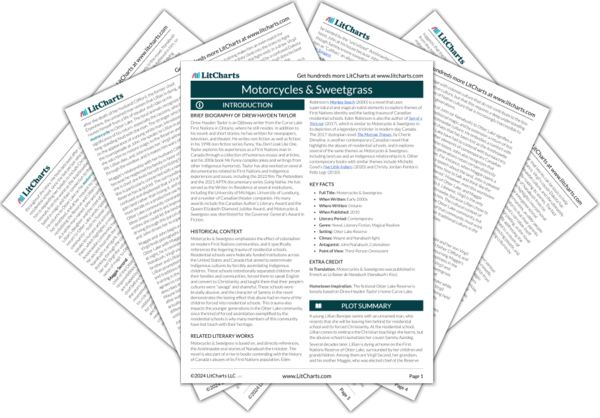John’s motorcycle represents the interaction of the modern, colonized world with ancient myth and tradition. The motorcycle is an Indian Motorcycle, a brand that is named after an outdated term for the Indigenous peoples of the Americas and which has used stereotypical imagery of those peoples in its branding. Despite this, the motorcycle also allows John to travel freely across his ancestral lands, and it is this freedom of movement that enables his return to Otter Lake. In this way, John reclaims the symbol of the Indian Motorcycle, changing it from something with an offensive name marketed towards white people to a tool that assists his efforts to help the Anishnawbe community of Otter Lake.
At the end of the story, John also learns from Jesus how to drive his motorcycle across water. The tension between the motorcycle’s significance as both John’s vehicle to spread magic and a symbol of an industrial and colonized world mirrors the conflicting feelings that Anishnawbe characters hold about Christianity. Jesus teaching John to drive across water marks the end of John’s resentment for Jesus, as he accepts that they can coexist. In the same way, the motorcycle represents the coexistence of traditional Anishnawbe culture and practices and those introduced by colonization. It symbolizes one way in which Indigenous people can come reconcile their traditions with colonial inventions.
John’s Motorcycle Quotes in Motorcycles & Sweetgrass
Even though the rider’s eyes were hidden, the crow could feel its piercing gaze. The rider lifted its helmet a few inches until only its mouth was visible. And from that mouth came a loud caw. Not a human imitating a crow, but what seemed to the crow an authentic crow caw. The crow had been around for a few years and knew the difference. Crows do communicate, in their own way, and “I'm back” is what the crow heard.

Unlock explanations and citation info for this and every other Motorcycles & Sweetgrass quote.
Plus so much more...
Get LitCharts A+Anishnawbe legends told of ancient and immense thunderbirds, their actions responsible for the kind of storm he currently found himself driving through. […] They, like the man on the motorcycle, had been born in an age when gods, monsters, humans and animals ate at the same table. Now man ate alone, while animals begged for scraps. The others were unable to survive in the new times and had disappeared into the folds of time. Who knew gods and monsters could and did fall victim to evolution?
It has been said that the land does not forget; it is in fact the memory of all who live on it. In today’s world, raccoons live closer to the earth than most people, so their memory too is longer.












